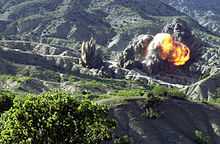Operation Jacana
| Operation Jacana | |||||||
|---|---|---|---|---|---|---|---|
| Part of the War in Afghanistan (2001–present) | |||||||
| |||||||
| Belligerents | |||||||
|
Coalition: |
| ||||||
| Strength | |||||||
|
45 Commando: 300 US Special Forces, Australian SAS, Norwegian FSK | Number unknown, probably light | ||||||
| Casualties and losses | |||||||
| None | 11+ killed and 9 captured | ||||||
Operation Jacana is the codename for a series of operations carried out by coalition forces in Afghanistan. The operations were carried out most notably by 45 Commando Royal Marines. U.S. forces, Australian SAS and Norwegian FSK also participated.[1] The operation was a follow-up operation of Operation Anaconda and was meant to kill or capture the remaining Al-Qaida and Taliban rebels. The operation has been called a "mopping up" operation after Operation Anaconda. The operation is named after an African bird type, jacana, described in one manual as "shy, retiring, easily overlooked".
Operation Jacana includes the following operations:[1]
- Operation Ptarmigan
- Operation Snipe
- Operation Condor
- Operation Buzzard
All these operations were meant to "clean up" the remaining Al-Qaida and Taliban forces out of the area of operations. Operation Condor began on 17 May 2002 right after a patrol of Australian SAS was ambushed. The Australian SAS called in an airstrike which killed ten rebels while another was shot by one of the Australians. The British 45 Commando then flew in to destroy the guerrilla force that had exposed itself.

Caves and bunkers containing arms, ammunition and supplies were found and destroyed.[2] Over 100 mortars, a hundred anti-tank weapons along with hundreds of RPGs, anti-personnel mines, rockets and artillery shells and thousands of rounds of small-arms and anti-aircraft ammunition. Two British marines confronted nine armed rebels and made them surrender.

45 Commando had been chosen for this operation due to their expertise in high-altitude warfare, for which they train regularly in the Norwegian mountains;[3] despite this experience, altitude sickness still became a problem with some of the marines, who needed to be airlifted out due to this condition. Norwegian special forces were also specifically asked by NATO to operate in these highland areas because of their experience in high altitudes and cold weather.
Source
- Special Forces: War Against Terrorism by Eric Micheletti. ISBN 2-913903-90-8
References
- ↑ 1.0 1.1 "Royal Marines - Afghanistan". www.eliteukforces.info. Retrieved 14 September 2012.
- ↑ "Operations in Afghanistan: Background Briefing 1". www.blogs.mod.uk. Retrieved 14 September 2012.
- ↑ "No time to chill: Marines endure temperatures of -30c in the Arctic as they prepare for combat in Afghanistan". Daily Mail. 27 January 2010. Retrieved 14 September 2012.
| ||||||||||||||||||||||||||||||||||